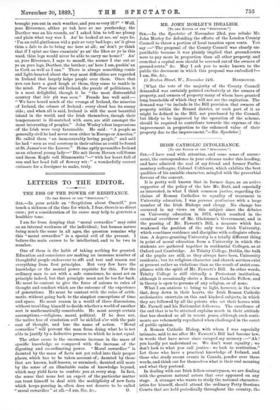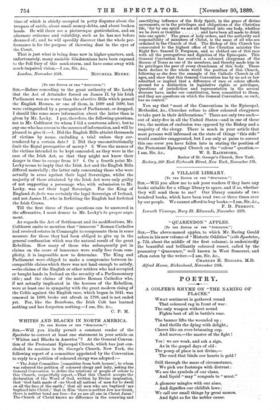IRISH CATHOLIC INTOLERANCE.
[To THE EDITOR OF THE "SPECTATOR."]
have read with attention, and some sense of amuse- ment, the correspondence in your columns under this heading, and have admired the zeal of ray friend and former Parlia- mentary colleague, Colonel Colthurst, which exhibits the best qualities of his amiable character, mingled with the proverbial fervour of the convert.
It is pretty well known that in former days, as an active supporter of the policy of the late Mr. Butt, and especially as interested, in what I think common justice, regarding the claims of Roman Catholics to equality of treatment in University educations I was persona gratissima with a large number of the Irish Bishops and clergy. No change has occurred in my views on this subject since the debates on University education in 1873, which resulted in the eventual overthrow' of Mr. Gladstone's Government, and in the passing of Mr. Fawcett's Bill, a measure which has weakened the position of the only true Irish University, which combines residence and discipline with collegiate educa- tion. A degree-granting University is a totally different thing in point of moral education from a University in which the students are gathered together in residential Colleges, as at Orford and Cambridge. At Trinity College, Dublin, the bulk Of the pupils are still, as they always have been, University residents ; but its religious character and church services exist at present rather as violations than as the result of strict com- pliance with the spirit of Mr. Fawcett's Bill. In other words, Trinity College is still virtually a Protestant institution, although it occasionally elects a Roman Catholic Fellow, and in theory is open to persons of any religion, or of none.
What I am anxious to bring to light, however, is the view that, deep down in their hearts, the Irish Roman Catholic ecclesiastics entertain on this and kindred subjects, in which they are followed by all the priests who set their horses with Mr. Parnell and his Nationalist followers. The excellence of the end that is to be attained explains much in their attitude that has shocked us all in recent years, although such senti- ments are vehemently repudiated when challenged in the court of public opinion.
A Roman Catholic Bishop, with whom I was especially intimate, said to me after Mr. Fawcett's Bill had become law, in words that have never since escaped my memory :—" Ah !
you hardly yet understand us. We don't want equality ; we don't look to what you call justice : we look to restitution." Let those who have a practical knowledge of Ireland, and those who study recent events in Canada, ponder over these words, and think out for themselves what is their real meaning and what they portend.
In dealing with our Irish fellow-countrymen, we are dealing with the greatest natural actors that ever appeared on any stage. A stranger who wants to study the national character- istics for himself, should attend the ordinary Petty Sessions Courts that are held periodically throughout the country, the
time of which is chiefly occupied in petty disputes about the trespass of cattle, about small money-debts, and about broken heads. He will there see a picturesque gesticulation, and an alternate reticence and volubility, such as he has not before dreamed of; and he will speedily discover that the whole per- formance is for the purpose of throwing dust in the eyes of the Court.
That is just what is being done now in higher quarters, and, unfortunately, many amiable Gladstonians have been exposed to the full fury of this sand-storm, and have come away with much-impaired vision.—I am, Sir, &c.,







































 Previous page
Previous page